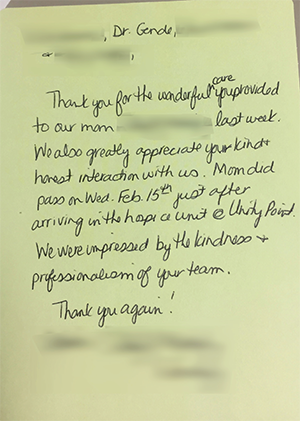
Explore This Issue
ACEP Now: Vol 36 – No 06 – June 2017Figure 1: A handwritten thank you note addressed to Dr. Gende and colleagues
It was my second shift in the SNICU. She was my third elderly female status post a devastating cerebrovascular accident. My third room overflowing with loved ones, tear-streaked faces, and a palpable fear of the unknown. My third goals-of-care discussion. My words flowed smoother this time as I talked the family through the transition of goals from treatment to comfort. They had reached a “do not resuscitate” decision but were still considering goals of care. Two hours before morning rounds, the patient’s prognosis was confirmed by repeat imaging—cerebral edema and uncal herniation. We revisited her end-of-life wishes and her family requested a transition of goals of care to comfort measures. The third time that shift, I entered comfort care orders.
Two SNICU weeks later, in somewhat of a zombie state, I found it lying open on the table in our workroom. It was handwritten and addressed to two physicians and two nursing staff. To my surprise, I was one of those physicians. My first “thank you” card, from the family of that patient (see Figure 1). “Thank you for the wonderful care provided. … We greatly appreciate your kind and honest interactions with us. We were impressed by the kindness and professionalism of your team.” I felt so good, so satisfied that I met their needs. I was proud that I supported them with a kind and professional demeanor and made a difficult situation a little easier for them. I was grateful for my role as a physician, for my ability to efficiently and effectively connect on a personal level with patients and families in stressful times.
Their expression of gratitude had me reflecting on my own gratitude and the role it plays in my well-being and experiences as a physician. In our fast-paced emergency medicine world filled with high rates of burnout, RVUs, and throughput times, we are bombarded by patient satisfaction scores—but what about our satisfaction?
Expressions of gratitude offer a path to resiliency by helping us find reasons to appreciate our daily lives and interactions. After this experience, I bought a journal decorated with bees to hold my gratitude list. I named it “Bee Thankful.” When I’m winding down from a shift, I pause and reflect on things from that day for which I am grateful. I breathe deeply and feel a sense of satisfaction when I write them on the page. My gratitude list reminds me of the positive interactions and opportunities my career offers and provides motivation to start the next day. Our experiences tax us as ever-giving and dedicated physicians, but the simple act of giving thanks can add to our health and vitality. May we all “Bee Thankful” and stay well.
Alecia Gende, DO
Iowa City, Iowa
Pages: 1 2 | Multi-Page





No Responses to “Gratitude from Families Helps Emergency Physician Appreciate Career, Life”